 Petzlover
Petzlover Drentse Patrijshond is originated from Netherlands but Treeing Tennessee Brindle is originated from United States. Both Drentse Patrijshond and Treeing Tennessee Brindle are having almost same height. Drentse Patrijshond may weigh 7 kg / 16 pounds more than Treeing Tennessee Brindle. Drentse Patrijshond may live 3 years more than Treeing Tennessee Brindle. Both Drentse Patrijshond and Treeing Tennessee Brindle has almost same litter size. Drentse Patrijshond requires Moderate Maintenance. But Treeing Tennessee Brindle requires Low Maintenance
Drentse Patrijshond is originated from Netherlands but Treeing Tennessee Brindle is originated from United States. Both Drentse Patrijshond and Treeing Tennessee Brindle are having almost same height. Drentse Patrijshond may weigh 7 kg / 16 pounds more than Treeing Tennessee Brindle. Drentse Patrijshond may live 3 years more than Treeing Tennessee Brindle. Both Drentse Patrijshond and Treeing Tennessee Brindle has almost same litter size. Drentse Patrijshond requires Moderate Maintenance. But Treeing Tennessee Brindle requires Low Maintenance
 The Drentse Patrijshond came about in the 1930-1950s. The breed developed from pointing dogs which originated in Spain, arriving in the Netherlands in the 16th century and being known as Partridge dogs.
The Drentse Patrijshond came about in the 1930-1950s. The breed developed from pointing dogs which originated in Spain, arriving in the Netherlands in the 16th century and being known as Partridge dogs.
The eastern part was known as the Province of Drenthe, and it is this area where these Partridge dogs were bred exclusively, not being mixed with other unknown breeds.
After World War II the Drentse Patrijshond was also recognized by the FCI. It was a popular dog in the Netherlands and the breed was also recognized by the Dutch Kennel Club in 1943. The Dretse’s popularity grew in other European countries too. In the 1960s some of the dogs entered the United States and in 2008 the Drentse Patrijshond Club of North America was established.
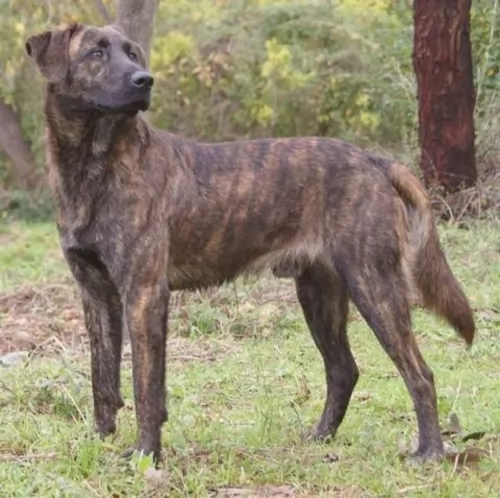 There doesn’t seem to be 100% clarity on how the dog came about but it originated in USA. It appears as though it was only since 1995 that records have been maintained through the American Kennel Club's Foundation Stock Service Program.
There doesn’t seem to be 100% clarity on how the dog came about but it originated in USA. It appears as though it was only since 1995 that records have been maintained through the American Kennel Club's Foundation Stock Service Program.
A Reverend Earl Phillips, who was a writer for a hunting magazine became aware of a Brindle Cur with a brown coat and tiger stripes. In fact ‘treeing’ is a type of hunting, where the dog chases an animal into a tree to escape. He heard about the dog’s amazing hunting skills.
In the early 1960s, he later formed The Treeing Tennessee Brindle Breeders Association, designed to protect the breed. It was in 2013 that the dog got foundation stock status with the American Kennel Club, but isn’t registered with the American Kennel Club.
 The Drentse Patrijshond is a medium to large sized dog standing between 55 and 63cm in height and weighing anything between 18 and 30kg. He is a working dog and known by other names such as Dutch Partridge Dog and Dutch Gundog among others.
The Drentse Patrijshond is a medium to large sized dog standing between 55 and 63cm in height and weighing anything between 18 and 30kg. He is a working dog and known by other names such as Dutch Partridge Dog and Dutch Gundog among others.
The coat of the dog is medium length and dense and is mostly white with reddish brown markings. People looking at him liken him to a spaniel, pointer or setter kind of dog. He is athletic and muscular with a long feathery tail, floppy ears and a brown nose with amber colored eyes.
The Drentsche Patrijshond is an amicable family dog who is relaxed and calm around other pets in the home as well as children. In fact it is the kind of dog that forms a strong bond with his human family, not liking to be left alone.
He is a lively, alert and playful dog with a tendency to be a bit stubborn but this is easily dealt with when he undergoes training and socialization. He is an adaptable dog, being able to fit into life in the city or the countryside, just so long as his beloved owners are close by. However, he is very active and will require an owner who will take time out to take him on walks or involve him in lots of outdoor activities.
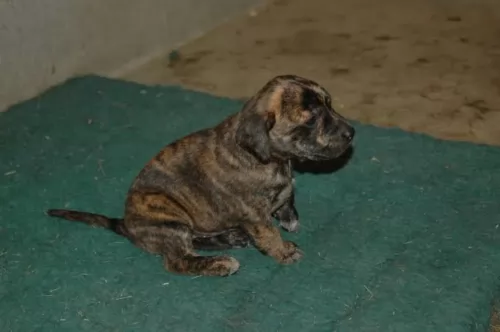 The Treeing Tennessee Brindle is a medium sized, deep chested breed of Cur, descending from the Old Brindle Cur dog.
The Treeing Tennessee Brindle is a medium sized, deep chested breed of Cur, descending from the Old Brindle Cur dog.
These strong dogs have a short, smooth brindle coat that is fairly soft to the touch. The coat's color is a mix of tan, black and a little bit of white.
He stands at between 41 and 61cm in height and weighs between 14 and 23kg both male and female. The Treeing Tennessee Brindle has a loud bark and it is best that this dog lives on a farm or in the suburbs as opposed to living in a small space in the city.
The Treeing Tennessee Brindle is a friendly, social dog and this is why he doesn’t make a particularly good watchdog.
He gets on well with children in the home as well as other dogs, not showing any aggression towards them.
They’re intelligent dogs and it will be a good idea to have them trained and socialized to make them well balanced and well behaved.
 The Drentse Patrijshond is a breed of dog that is particularly human orientated – just loving being around his human family.
The Drentse Patrijshond is a breed of dog that is particularly human orientated – just loving being around his human family.
He forms a deep bond with those that care for him and he can’t bear to be separated from his human family. The dog has always had a strong hunting instinct but these days this sweet, loyal dog is much more a devoted family pet who is more than happy to come indoors and make himself at home among his family members.
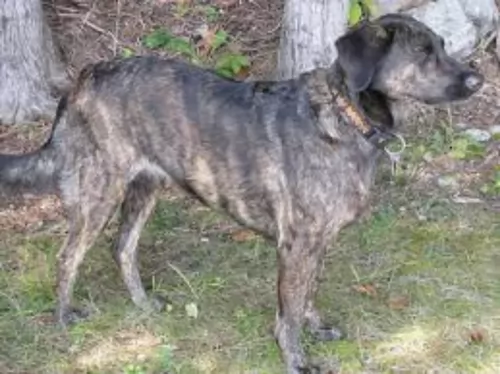 This brindle-colored cur dog is brave, intelligent and lively and his temperament allows him to be a good companion for his human family.
This brindle-colored cur dog is brave, intelligent and lively and his temperament allows him to be a good companion for his human family.
Even though they are friendly around strangers, they still make good watchdogs and will alert you to all kinds of visitors to your property. They do best in a home with large grounds and an active family where they can explore and sniff around. At the end of the day, they love to lie contentedly at your feet, a loyal, loving companion.
 The Drentse is a fairly healthy dog breed, with a life span of 12 to 15 years. No matter how healthy your dog, there will always be some health issues it may face. Environmental factors and diet can play an important part in his wellbeing.
The Drentse is a fairly healthy dog breed, with a life span of 12 to 15 years. No matter how healthy your dog, there will always be some health issues it may face. Environmental factors and diet can play an important part in his wellbeing.
Health concerns with this breed can include progressive retinal atrophy, hip dysplasia as well as hereditary stomatocytosis. This is a disorder that affects the dog’s cells walls.
Too much fluid gets into the cells and this damages red blood cells. Some breeds are more prone to this disorder, and the Drentse Patrijshond is one. It is an hereditary disorder that results in chronic anemia and liver disease.
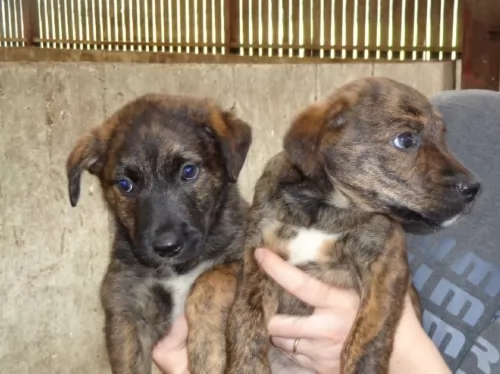 The Treeing Tennessee Brindle is a robust, healthy breed. You’re not likely to battle with too many health issues with him.
The Treeing Tennessee Brindle is a robust, healthy breed. You’re not likely to battle with too many health issues with him.
Watch out for ear infections which are more common in floppy eared dogs. Other common dog diseases that you need to know about -
This is a viral disease which is highly contagious and with no known cure. It’s why there is a vaccine against it. Coughing, lethargy, high temperature and loss of appetite with vomiting are symptoms of this disease.
This is another highly contagious respiratory viral infection transmitted between dogs in close proximity to each other, like in kennels for instance.
Symptoms include coughing, sneezing, nasal discharge, breathing difficulties, lethargy and loss of appetite. It’s important to get veterinary assistance as pneumonia could set in.
 This dog is quite a heavy shedder, but even so, he won’t need professional grooming – just a good brushing twice a week.
This dog is quite a heavy shedder, but even so, he won’t need professional grooming – just a good brushing twice a week.
The teeth will need to be brushed 2 or 3x a week and because he has floppy ears, these will need to be checked for infection. It’s a good idea to clean them with some special dog ear cleanser, but if you’re not sure how, your vet or a professional groomer can do it for you.
Cut your dog’ nails, but once again if you think you might cut into the quick of the nail, causing bleeding and pain, a professional groomer can do it for you.
The Drentsche Patrijshond will require quality dry dog food. Speak to your vet about the best kibble that ensures your pet gets his full quota of vitamins and minerals. Add in cooked brown rice, vegetables and chicken from time to time and include some raw meat wherever possible. Adding in some raw meat helps to stave off dry, red, irritated skin. Your pet will also need access to fresh, cool water day and night.
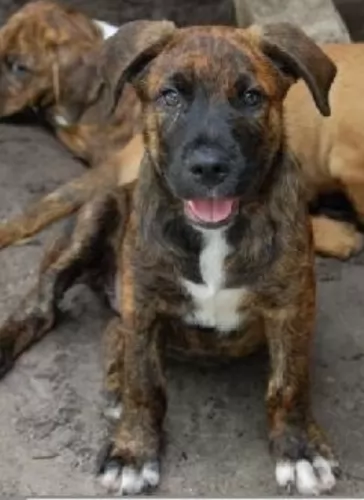 A brush once or twice a week will be sufficient for this dog. Look inside his ears for signs of redness which could indicate an ear infection. Make sure his eyes are still bright and not red and with a pus discharge. Trim his nails too.
A brush once or twice a week will be sufficient for this dog. Look inside his ears for signs of redness which could indicate an ear infection. Make sure his eyes are still bright and not red and with a pus discharge. Trim his nails too.
The Treeing Tennessee Brindle is a high energy dog and he is going o want more than just a walk every day, although he will love that and rely on you for this daily outing.
He will also want ball games and hide and seek games.The breed needs an active owner who will take him on long walks and hikes.
Whenever you opt to give a dog commercially manufactured dog food, you need to check that the dog food is made with high-quality ingredients which are mostly made up of protein or meat.
Certainly a puppy will need protein in his food for proper growth and he will require 4 bowls of food a day. An adult dog will require 2 bowls of food a day.
The type of commercial dog food you buy will depend on the age of your dog as well as his activity levels. If your dog has a known allergy or illness, there are dog foods manufactured with that in mind.
Try and in include some homemade food into his diet. Nothing spicey and exotic as this can cause stomach problems. A good guide is boiled chicken, brown rice and vegetables.